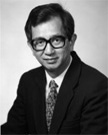
Yuan T. Lee is a Taiwanese born chemist best known for his Nobel Prize winning work in the field of crossed molecular beam research. In 1986 he received the Nobel Prize, along with Herschbach and Canadian scientist John C. Polanyi for their joint work in crossed beam molecular research, or more particularly, for their contributions concerning the dynamics of chemical elementary processes. Their groundbreaking work made it possible to analyze much larger and more complex chemical molecules than those previously studied. Many years after Charles Townes won a Nobel for his research laying the groundwork for the laser, Yuan Lee took that work steps further.
Lee's designs and experiments with molecular beam devices sent streams of intensely packed molecules into each other at supersonic speeds. Scientists were then able to view chemical reactions and discover how and why they take place. This knowledge has contributed to today's powerful lasers used by many researchers from diverse disciplines. The first Taiwanese born Nobel prize winner Lee, in January 1994, after 32 years of research and teaching in the U.S., he took the important step of returning to his home country, Taiwan, to serve as President of Academia Sinica.
Among some of the awards and recognitions he has received over the years include: Alfred P. Sloan Fellow, 1969-1971; Camille and Henry Dreyfus Foundation Teacher Scholar Grant, Receipient 1971-1974; Fellow, American Academy of Arts and Science, 1975; Fellow, American Physical Society, 1976; John Simon Guggenheim Fellow, 1976-1977; Member, National Academy of Sciences, 1979; Member, Academia Sinica, Taiwan, China, 1980; Honorary Professor, Institute of Chemistry, Chinese Academy of Science, Beijing, China, 1980; Honorary Professor, Fudan University, Shanghai, China, 1980; Miller Professorship, University of California, Berkeley, California, 1981-1982; Ernest O. Lawrence Award, U.S. Department of Energy, 1981; Sherman Fairchild Distinguished Scholar, California Institute of Technology, 1983; Harrison Howe Award, Rochester Section, American Chemical Society, 1983; Nobel Prize in 1986; Peter Debye Award of Physical Chemistry, American Chemical Society, 1986; National Medal of Science, 1986; Honorary Professor, Chinese IJniversity of Science and Technology, Hofei, Anhuei, China, 1986; Honorary Doctor of Science Degree, University of Waterloo, 1986.

